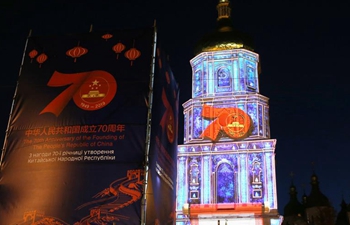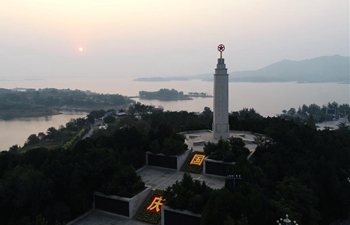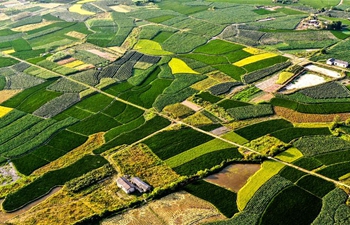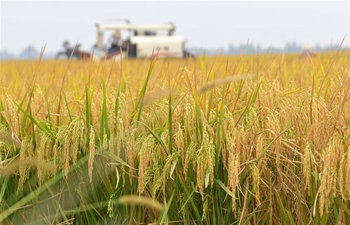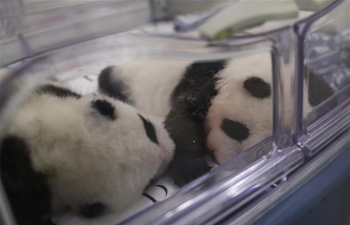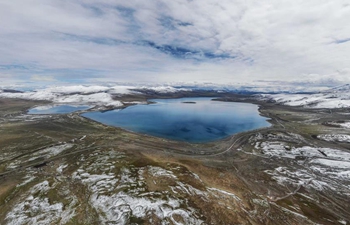
A staff member works inside a pharmaceutical factory in Gaza City, Sept. 18, 2019. Gaza Strip's only pharmaceutical factory has been struggling to survive, amid the deteriorating economic situation caused by Israel's 12-year blockade on the Palestinian seaside territory. (Photo by Rizek Abdeljawad/Xinhua)
GAZA, Sept. 30 (Xinhua) -- Gaza Strip's only pharmaceutical factory has been struggling to survive, amid the deteriorating economic situation caused by Israel's 12-year blockade on the Palestinian seaside territory.
The factory was established in 1994 by the Middle East Pharmaceutical and Cosmetics Laboratories Ltd, but production started in 1999.
"The factory met the international standards for manufacturing pharmaceutical products," chairman of the Middle East Pharmaceutical and Cosmetics Laboratories, Marwan al-Astal, told Xinhua.
The pharmaceutical plant, which hires 60 workers of whom two thirds are pharmacists, produces a variety of medicines that are all pumped into local markets.
"We sell the products with low profit margin in order to help alleviate the dire economic conditions faced by the people in Gaza," al-Astal said, adding that "the Israeli blockade and the economic crisis which it brought could terminate our business."
However, he said that the factory is still struggling to survive and it currently provides the local market with 13 of the needed medicines.
"Despite the decline in the production of dozens of pharmaceutical products that we used to make and export to the West Bank as well as Algeria, we are now able to produce other types of medicines through which we were able to rebalance the profit rate," he said as he checked some documents on his desk.
Al-Astal explained that one of the most important reasons that contributed significantly to the decline in the productive capacity of the factory is the repeated Israeli incursions into the plant, adding that the factory was once seized by the Israeli army for more than three continuous months.
He noted that these Israeli intrusions began since 2003, adding that the Israeli forces occupied his plant during a large-scale military confrontation with armed Palestinian factions in northern Gaza Strip.
The matter did not end at this point, al-Astal said, adding that "it was followed by several Israeli airstrikes, forcing us to temporarily halt our activities many times to repair the partial damage."
According to al-Astal, the Israeli blockade has been the biggest obstacle hindering the production process and the development of the factory.
"Since the blockade was imposed in 2007, the Israeli authorities prevented the entry of many raw materials needed for the pharmaceutical industry, which reduced the production rate at times to 80 percent," he complained.
The whole Gaza Strip has been placed under a tight Israeli blockade since Islamic Hamas movement seized the territory by force in 2007 after routing forces loyal to President Mahmoud Abbas, who now only controls the West Bank.
In the past decade, Israel and Hamas movement have been engaged in three major wars that claimed the lives of thousands of Palestinians and Israelis and caused the destruction of hundreds of homes and industrial facilities in the tiny Palestinian enclave.
The blockade and the repeated military conflicts between Israel and Palestinian factions have pushed the 2 million population in Gaza deeper into poverty and despair.
A report released in February by the Palestinian Central Bureau of Statistics showed that unemployment rate in the Gaza Strip reached 52 percent in 2018, up from 44 percent in 2017.
Local and international organizations warned that Israel's embargo has led to a severe humanitarian deterioration in all aspects of life in the Gaza Strip.
According to Palestinian figures, the per-day income in Gaza is only 2 dollars, while 85 percent of the populations are living under the poverty line.
Meanwhile, Secretary of the Federation of Construction Industries, Mohammed Al-Assar, said the Israeli blockade led to significant losses in the private industrial sector in general and industrial construction sector in particular.
He added that Israel continues to ban the entry of about 400 items of raw materials and goods into Gaza, impeding the reconstruction of what was destroyed during the 2014 war.
Manager of the factory Sami al-Taaban said that the plant continued to use 20 percent of its production capacity.
"However, we managed to find alternatives to maintain the minimum profits as well as keeping our workers. The alternative was producing other varieties of medicines and cosmetics to ensure the continuity of work," al-Taaban told Xinhua.
He added that the process of producing medicines takes months as raw materials take long time to be allowed to enter into Gaza which "leads us to produce less quantity."





